Underneath South Korea’s global reputation as a cultural powerhouse and global trendsetter lies a mental health crisis, which is the leading cause of suicide among the younger generation. Moonbin, a member of the K-pop boy band ASTRO, was found dead on April 19, 2023 at his apartment in Gangnam; it was apparently a suicide. Prior to this incident, Jonghyun, a former band member of SHINee who was struggling with depression, died on December 18, 2017, at age 27 by suicide. His last words in his suicide note were, “I am broken from the inside. Depression, which was eating me away, has devoured me in the end, and I could not beat it.”
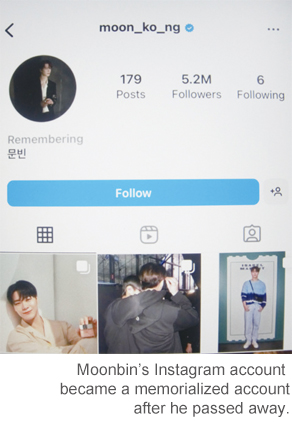
The incessant media coverage of K-pop star suicides highlights the necessity of addressing the prevalence of depression in South Korea, a full-blown social crisis not limited to certain age groups or backgrounds. However, the younger generation particularly bears the brunt of the issue. Among the 38 Organization for Economic Co-operation and Development (OECD) countries, South Korea has the lowest life satisfaction rating and the highest suicide rates in the past two decades. In fact, those experiencing depression in their 20s have nearly doubled since 2015, with 34.1 percent suffering from it in 2021. According to the Health Insurance Review and Assessment Service, 4 out of 10 people are currently struggling with depression in Korea.
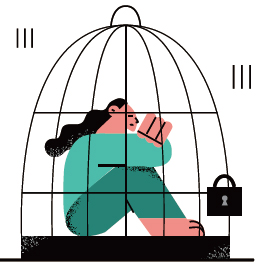
Unemployed and Depressed
The staggering rate of depression is a manifestation of the pressure and stress that the younger generation faces in a hyper-competitive society. The unemployment rate among the youth has soared during the COVID-19 pandemic. An increasing number of college graduates are giving up searching for a new job and university graduates are turning to graduate school to fill the time gap in employment. Half a million of the younger people aged 15-29 have given up working and have labeled themselves as “taking time off.”
Another concern in such an unstable job market and economic situation is the difficulty of finding long-term jobs. South Korea has the second-highest proportion of irregular workers among the OECD nations, and short-term jobs and internships are widely prevalent. Although COVID-19 has undoubtedly contributed to this phenomenon, the fundamental failure of the economic and employment policies of the nation cannot be underestimated.
Financial Stress
At the core of high depression rates lies economic woes. With the prevalence of online mob culture due to social distancing, relative deprivation has emerged as a significant social problem. Despite a downshift in economic growth, consumer spending continues to remain significantly high. In the contemporary oversharing society, people often pursue a luxurious lifestyle on social media, which compels the youth to jump onto the consumption bandwagon. In fact, many have been trying to make profits from Bitcoin because their salaries are not enough to support their “instagrammable” lifestyle. However, with the Bitcoin prices falling off the cliff, many have inevitably fallen into depression.
In addition, the housing crisis in the capital area has further widened the financial gap between the haves and the have-nots. Housing prices have nearly doubled since 2017, and a spiking rise in rents has made the situation difficult for young people. Banks have been keeping a tight grip on credit, and the younger generation is relying on costly credit cards to stay afloat. From banks to burger joints, the South Korean economy is exhibiting extreme signs of stress, and the young population is particularly feeling the pinch of the high inflation rate. Such instability in the economy has impacted the job market, with companies cutting back on white collar workforce, which results in a high unemployment rate. Working one’s way up the social ladder seems a myth in today’s Korea.
The Depressed State of Students in the University of Seoul (UOS)
A total of 48 postings on depression were uploaded by UOS students in April, 2023 on Everytime, a UOS online community. Seven postings of them even had implications of suicidal thoughts. As this online community is used by almost every UOS student, the postings suggest that many of them are struggling with their mental health. The UOS Times interviewed 32 students about the tragic circumstances.
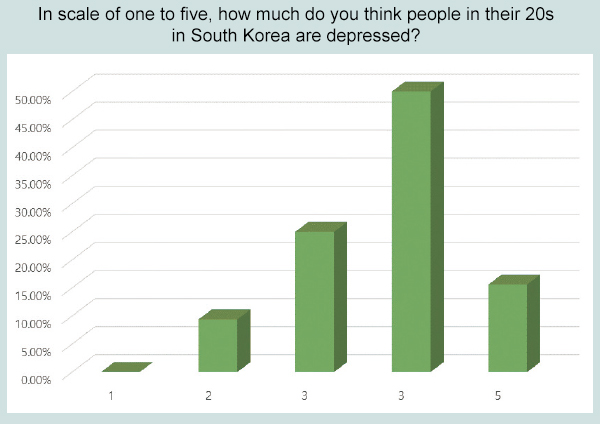
The first table here shows that several students in UOS viewed depression in the 20s as quite prevalent. No one thought otherwise, and the majority of students rated the prevalence of depression in the 20s highly.
Each student also shared their opinion on why they think people in their 20s are depressed, and the answers are highly varied. The following are the top three reasons: “Social Pressure: Without constant effort, the 20s are easily perceived as a failure, thus they feel pressured to meet others wish,” “Anxiety about the future: Achieving life’s purpose is too hard to pursue. Hence the 20s become a period of anxiety, lethargy, and feelings of emptiness,” and “It is too hard for the 20s to get a job.”
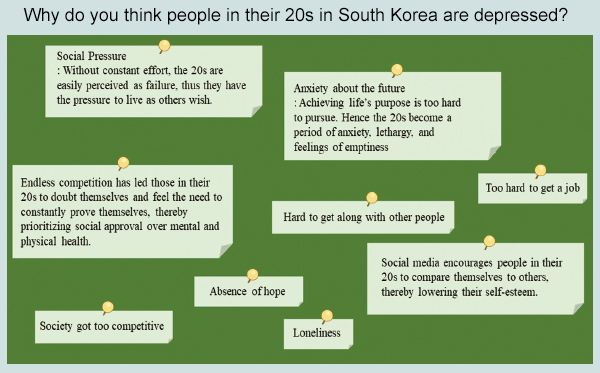
Other opinions are: “Social media encourages people in their 20s to compare themselves to others, thereby lowering their self-esteem,” “Endless competition has made those in their 20s lack of confidence and feel the need to constantly prove themselves, thereby prioritizing social approval over mental and physical health.”
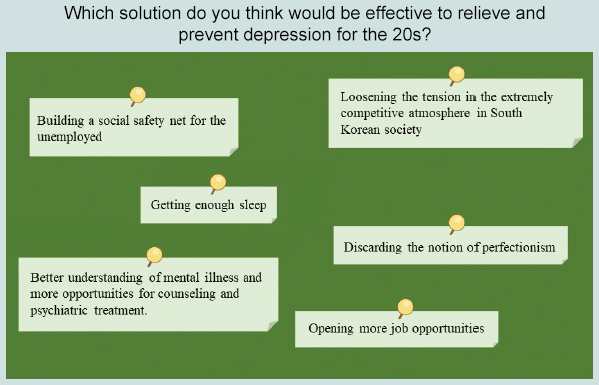
The students of UOS also offered solutions to relieve and prevent depression for the 20s. The first solution is to increase general welfare for these individuals, as in opening more job opportunities, loosening the tension in the extremely competitive atmosphere in South Korean society, and building a social safety net for the unemployed.
Moreover, it is necessary to discard the notion of perfectionism by telling younger generations that it is fine not to follow the so-called “perfect image” that society demands. For those suffering from depression, there must be better understanding of mental illness and more opportunities for counseling and psychiatric treatment.
Efforts to Relieve Depression

There are several policies aiming at the prevention of depression of the 20s and relieving social pressure to lessen their financial burden. Some policies provide monetary support to the young generation. A person aged over 19 and under 34 with an income can open a youth-friendly housing subscription savings account, which offers a higher interest rate than other housing subscription savings accounts.
Moreover, people aged from 18 to 32 living in Seoul can open the Double Hope Youth Savings Account, which offers a relatively higher interest rate. The application period of this account was from June 2, 2022 to June 24, 2022, and about 7,000 people have opened one so far. Furthermore, the website “Online Youth Center” provides information on youth policies that the younger generation find beneficial.
In an interview with Health Josun, Professor Paik Jong-woo of the Department of Psychiatry at Kyung Hee University Medical Center said that approximately 60 to 70 percent of people with depression consider suicide, and 15 percent of them commit suicide. To prevent people from making such an irreversible decision, there are about 11 local Suicide Prevention Centers all over the country, including Seoul, Busan, Gwangju, and Incheon.
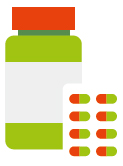
These centers are operated by the Korea Foundation for Suicide Prevention, which was launched under the Ministry of Health and Welfare by integrating the Korea Suicide Prevention Center and the Korea Psychological Autopsy Center to protect people from committing suicide and carry out projects in line with national policy direction. In 2018, South Korean government announced the National Suicide Prevention Action Plan to launch a calibrated movement to decrease the suicide rate.
Depression among people in their 20s, who are the future leaders of this society, is a serious social phenomenon. In the interview mentioned above, Professor Paik noted that 80 percent of people with depression try to handle their difficulties by themselves, which often makes their mental health worse. Moreover, he emphasized that depression is treatable with proper support. Depression in those in the 20s in the South Korean population must be resolved in a timely manner with policy-level solutions for those involved and the society at large.
Inside Cover Story
How to Treat Someone with Depression
The Asan Medical Center defines depression as a condition where the overall mental functioning such as the processes of thinking, motivation, interest, and sleep, continues to deteriorate, thus adversely affecting daily life. There are nine diagnostic criteria for depression, and if someone suffers from more than five of those, he or she can be diagnosed as being depressed.
[Diagnostic Criteria for Depression]
1. A melancholy mood that lasts for more than two weeks, almost every day.
2. Less interest in most daily tasks.
3. Losing or increasing appetite (losing or gaining weight, exceeding 5 percent per month)
4. Sleep deprivation or excessive sleep
5. Delay in mental exercise
6. Chronic fatigue or decrease in energy
7. A sense of futility
8. A lack of concentration
9. Repeated suicidal thoughts
(These criteria are based on DSM-IV codes, published by the American Psychiatric Association.)
The most tragic outcome of depression is suicide. Treating someone with suicidal thoughts requires care and attention. Most people tend to avoid using the word “suicide” as a topic of conversation with those suffering from depression. However, addressing it directly can be rather effective. According to the Center for Campus Life and Culture in Seoul National University, asking “Do you have thoughts on suicide?” can make people with depression realize that they have dangerous thoughts and need medical attention.
Moreover, there are some dos and don’ts when treating people with depression. One of the don’ts is to judge the circumstances of the patient. Listening and acknowledging is more helpful than judging as it conveys to them that they are understood. Trying to know everything in the lives of the person with depression is also not recommended. Instead, saying “You can talk to me later, thank you for sharing” can give them the mental comfort to contemplate their situation and mental health on their own.
How Safe Are You from Social Media
Social media which highlights only the best moments of lives tends to provoke people to constantly compare themselves with others. How many likes a post gets and who likes a post are important validations of self-worth and value. In fact, social media does much more than merely connecting with friends.
It has a direct impact on our self-esteem and sense of belonging. With a staggering number of people oversharing and posting their lives online, the “fear of missing out” (FOMO) has become a serious issue, an expression widely used with the increased use of social media. In fact, many people have gone through the stage where their purpose of interaction has been more focused on posting their social interactions rather than the interaction itself. In other words, they feel the need to prove to others that they are not “excluded.”
In addition, upward social comparison is an extremely common problem in social media. We evaluate our lives based on the best versions of other people, which often hurts self-esteem. An employee working at a small-sized company claimed, “I am stressed about the social atmosphere that pushes me to compare myself to others and compete for better pay, a better house, and better education for my children all the time. All I want is to be happy and enjoy the moment without having to care about what others think.”
Social comparison greatly contributes to depression and anxiety; yet individuals engage in it to assess how well they are doing. Social media increases its users’ tendency of upward social comparison, thereby reinforcing their depression. Thus, the intervention of practical means to help alleviate self-deprecation and attempting social media abstinence may be an effective way to reduce depression.
Kim Da-eun
daeunkim749@uos.ac.kr
Kim Ryoung-kyoung
ryoung0809@uos.ac.kr

